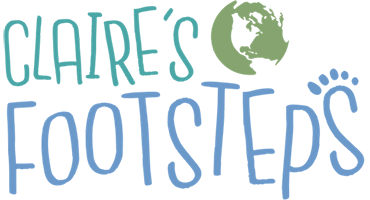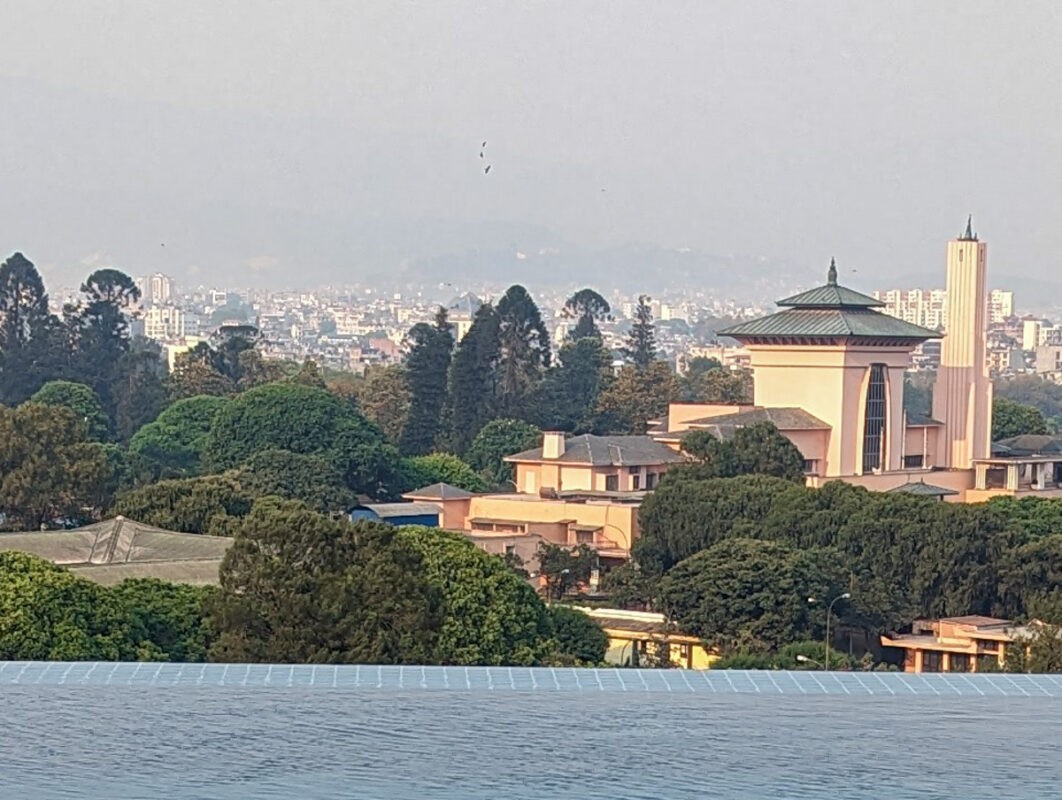Is Kathmandu safe for travellers? This post is my analysis after my week here!
The buzzing Nepali capital of Kathmandu is plenty of things. Hectic, vivacious, a little overwhelming – but is it safe?
Generally, I thought it was safe, but if you’ve not travelled to similar cities, there are a few things that you’ll want to bear in mind.
I spent a week in Kathmandu after my Everest Base Camp trek, and here are all my thoughts on its safety!
Is Kathmandu safe?
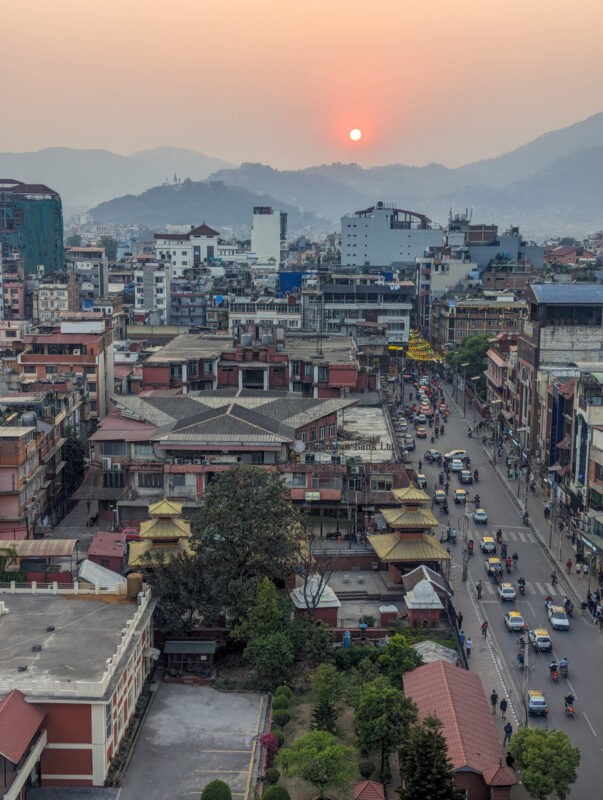
In many ways, yes, Kathmandu does feel safe.
The culture is very warm and welcoming and people are, for the most part, friendly and helpful – I even experienced this when walking around as a solo female.
However, there are a couple of things to be mindful of while you’re here – mainly road safety and the risk of food poisoning!
Let’s get into it.
Crime rate in Kathmandu
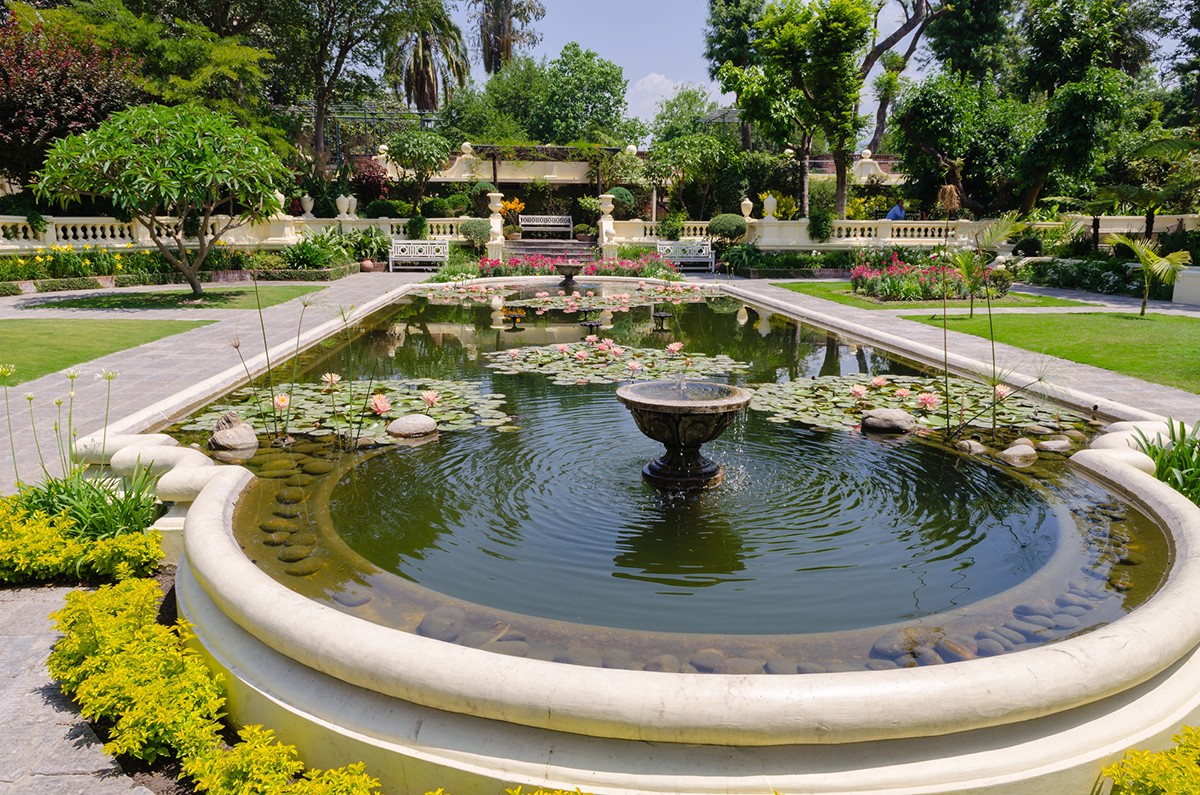
The crime rate in Kathmandu is quite a lot lower than other cities around the world – including many in Europe and the U.S.
If you take a look at the crime comparison on Numbeo, Kathmandu actually comes up safer in most categories than London, including general level of crime.
This isn’t to say London isn’t safe, it’s just to highlight that if you’re happy to visit London, you should be happy visiting Kathmandu when it comes to the crime rate.
Women travellers in Kathmandu
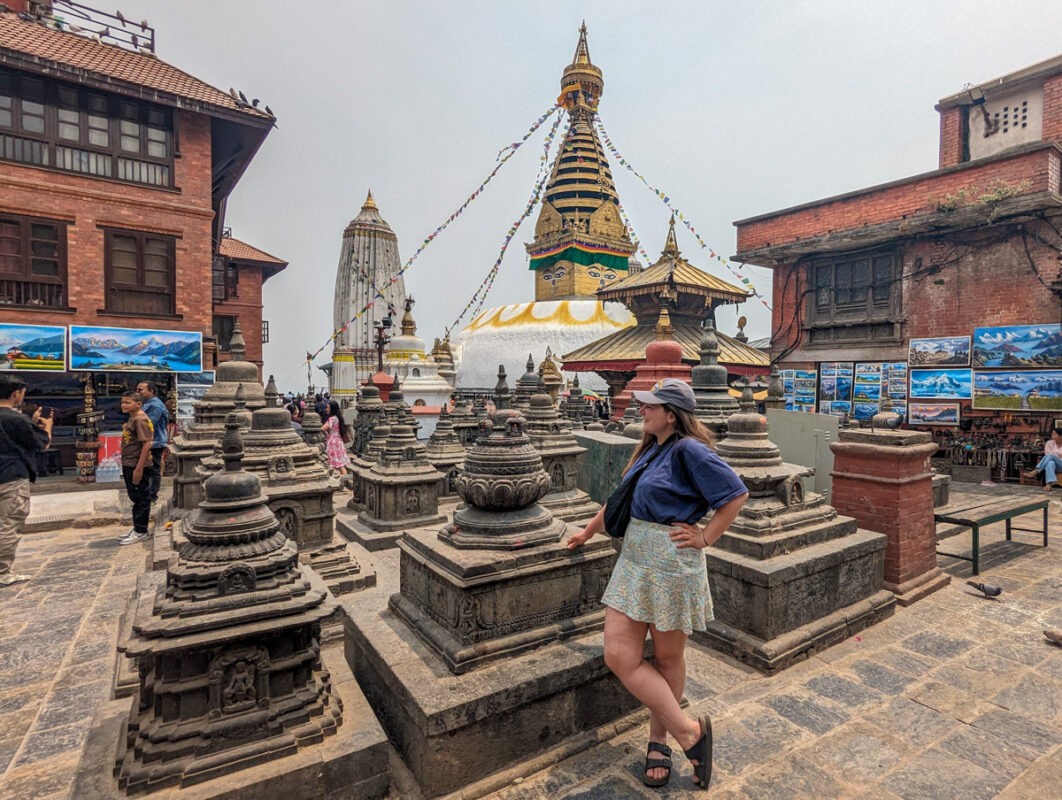
I can’t speak too much for solo female travel in Kathmandu, as I was there with my partner and spent most of my time with him.
However, I’ve travelled solo a lot all over the world and think I can quite accurately gauge how safe somewhere is for solo females from a few walks around the city on my own.
Generally, the vibe of Kathmandu was friendly and welcoming to solo female travellers, but I did notice a few more people would approach me and ask me more invasive questions than when I was with my partner.
These people definitely were in the minority – most people were just as genuine, friendly and helpful when I was on my own than when I was with my partner – but it was ever so slightly noticeable.
I would return to Nepal and travel on my own, but if I did so, I’d stay safe by doing the following:
- Stay in a secure, comfortable and large hotel like Hotel Barahi.
- Not give out too much personal information (i.e. where I’m staying, how long I’m staying for, where I’m going next) to taxi drivers, vendors, tour guides – or anyone!
- Not venture out of Thamel after dark, and not walk around Thamel after shops and businesses have closed.
- Stick to just one or two alcoholic drinks.
Some of these precautions are over-cautious, but they don’t impact my stay and I know that by doing them, I amplify my safety.
Road safety in Kathmandu
Road safety in Kathmandu is something the city could improve on!
All day and most of the night, motorbikes weave in and out of the pulsating streets – and sometimes onto pavements.
Generally, they’re moving slowly, and they are experts at dodging unsuspecting tourists! I didn’t see bikes or tuk tuks actually hit anyone during my stay, although I saw a few near misses.
To stay safe on the roads, just be extra careful when crossing. I wouldn’t recommend self-driving in Kathmandu (or anywhere in Nepal); generally taxis are safe throughout the capital.
Just don’t forget to confirm the price before getting into the cab.
Monkeys and stray dogs in Kathmandu
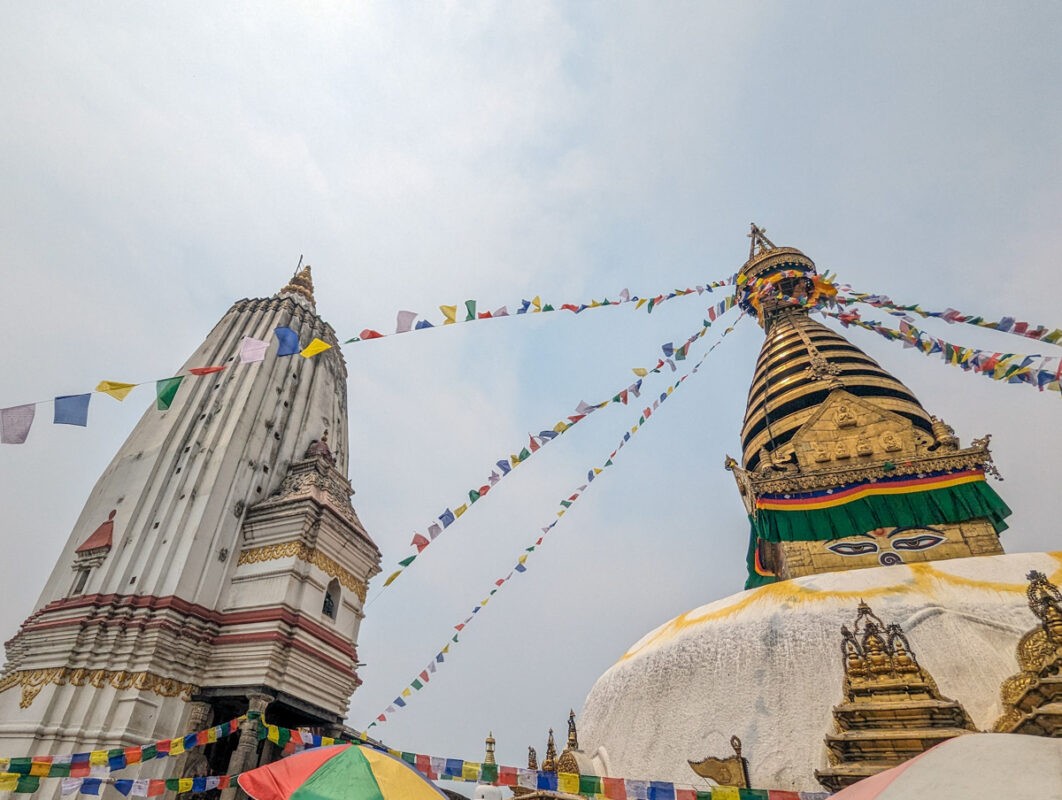
There aren’t too many monkeys in Kathmandu, but you will see them at Swayambhunath Stupa.
In fact, this stupa has been affectionately dubbed “Monkey Temple” thanks to its abundance of the primate!
Rabies and other animal-borne diseases do exist in Nepal (according to this data, 15 to 36 people die of rabies annually – all cases are fatal). I’d recommend not approaching, stroking or feeding the monkeys due to this.
There are also some stray dogs in Kathmandu, although I didn’t experience any of these to be aggressive. Again, dogs in Kathmandu can also have rabies.
Can you get altitude sickness in Kathmandu?
While altitude sickness is an important safety concern if you’re heading to the mountains (such as to Everest Base Camp), it’s not as much of an issue in Kathmandu.
Kathmandu sits at 1400m altitude, which is typically too low to have notable altitude sickness symptoms.
If you travel from sea level directly to Kathmandu, you might notice the air is a little thinner, but you shouldn’t feel any serious symptoms of altitude sickness here!
Food and drink safety in Kathmandu
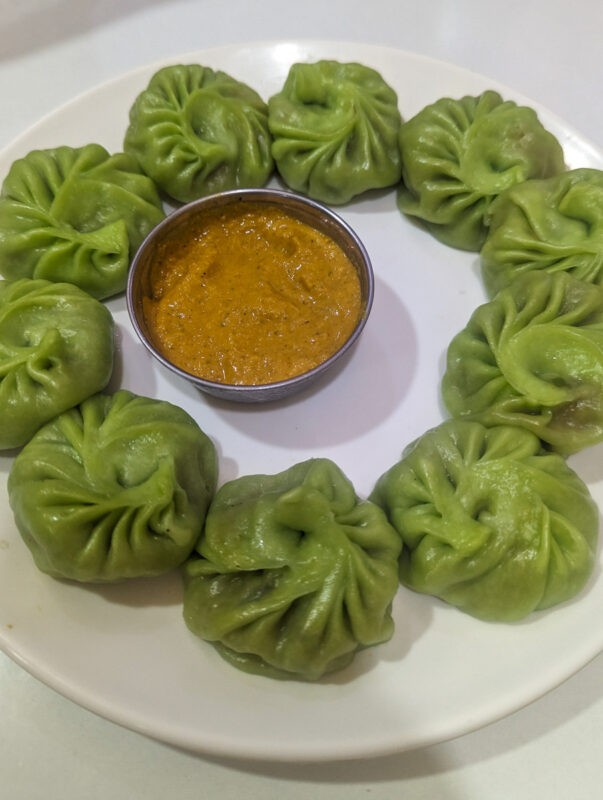
Unfortunatley, food and drink issues are quite common in Kathmandu.
Food-wise, it’s very common to get traveller’s diahorrea here. This might be due to differing cooking methods, ingredients you aren’t used to or unsanitary kitchens. I left Kathmandu with a bad stomach which took me a couple of weeks to rectify!
Regrettably, sometimes there’s no avoiding food poisoning in Kathmandu or elsewhere in Nepal, but you can do a few things to lessen your chances of falling ill:
- Only eat food that’s been freshly cooked
- Be very careful with meat (and definitely fish!)
- Look at TripAdvisor or Google reviews before selecting a restaurant to eat at
Is tap water safe to drink Kathmandu?
Tap water is definitely not safe to drink in Kathmandu!
Water-borne diseases are common here.
Stick to bottled water, or even better, purchase a water-to-go bottle before your trip and use it to filter tap water.
Medical care in Kathmandu
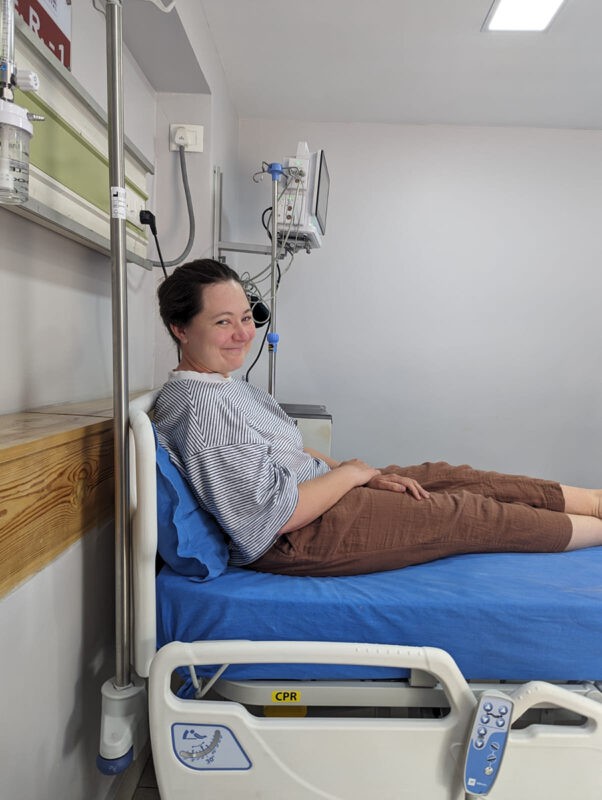
Kathmandu does have very good, tourist-friendly medical care – basically all trekkers who experience altitude sickness end up here – so you’ll find plenty of clean, international hospitals with English-speaking staff.
There’s one catch – these hospitals are expensive. So, make sure that you have adequate medical insurance for your trip!
I ususally use SafetyWing and highly recommend them. However, if you are trekking above 4,500 metres altitude and/ or need helicopter evacuation coverage, SafetyWing won’t be able to cover you.
Instead, I used TrueTraveller insurance. They are pricey, but they are made for Everest Base Camp trekking.
I did actually experience Kathmandu’s hospitals first-hand – after my EBC trek, I came down with a bad case of hives all over my body!
I ended up at ERA Medical Hospital, and have no complaints about the hospital itself and its treatment. Staff were professional, spoke excellent English and it was clean and hygienic. They assessed the problem straight away and the drugs that they used were effective.
My only complaint, as I mentioned above, was the price and the fact that the hospital is a business model that aims to get as much money out of patients as possible.
It wasn’t a huge deal for me as I got the money back from my insurance, but I was advised to have a large amount of treatment that I potentially didn’t need, and I actually technically discharged myself against doctor’s advice because they wanted to keep me in for observation.
From the hospital’s perspective, they had plenty of vacant beds and staff working, so I guess it makes sense to them to keep patients in even if they’re mostly better – but from my perspective, I’d get a night of much better sleep in the lovely hotel we were staying in than on a hospital ward, which would aid my healing!
Kathmandu safety tips
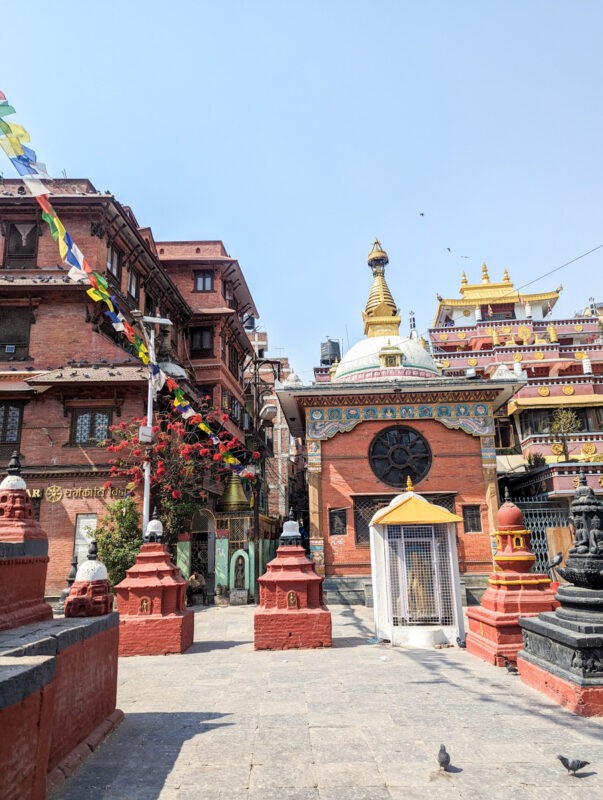
Here are some general tips for Kathmandu safety!
- Be mindful of your belongings: Pickpocketings can happen in crowded areas like Thamel and Durbar Square.
- Avoid drinking tap water: Stick to bottled or purified water to avoid waterborne illnesses. Avoid ice in drinks unless you’re sure it’s made from purified water.
- Be cautious with street food: While delicious, street food can sometimes lead to stomach issues. Choose vendors with good hygiene practices.
- Respect local customs: Dress modestly and respect religious sites and practices. Always ask for permission before taking photos of people.
- Stay updated on weather and road conditions: Kathmandu’s weather can change rapidly, and roads can be hazardous during monsoon season. Plan accordingly.
- Carry small denominations of cash: Large bills can be hard to break, and having smaller denominations is more convenient for daily transactions. Leave your passport and other valuables in your hotel’s safe.
- Stay connected: Keep a charged phone with local emergency numbers saved. Consider purchasing a local SIM card for easier communication – they’re easy to get in Thamel.
- Secure your accommodation: Choose accommodations with good reviews regarding safety and security. I felt very secure at Hotel Barahi. Ensure doors and windows are locked when you leave your room.
So, are you ready to visit Kathmandu?
Is Kathmandu dangerous or safe? My general consensus is it’s safe, provided you take precautions when it comes to road safety and food (and are more mindful if you’re a solo female traveller).
I’m posting about my Nepal trip on TikTok, Instagram and YouTube, so follow them for more!
